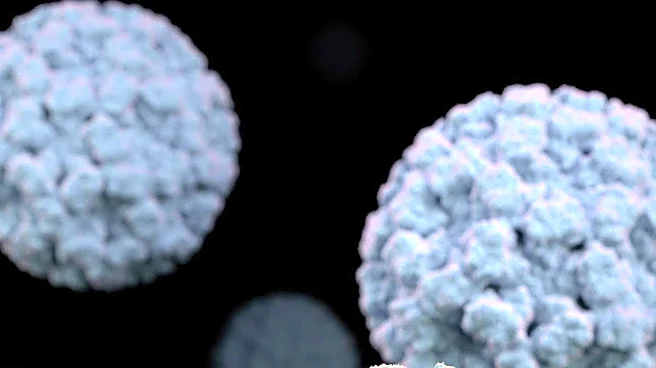What's Happening?
CARsgen Therapeutics has presented preliminary results from a Phase Ib clinical trial of satricabtagene autoleucel (satri-cel) for adjuvant therapy in pancreatic cancer at the ESMO Congress 2025. The trial, which is the first proof-of-concept study exploring
CAR T-cell therapy for solid tumors, involved patients with Claudin18.2 positive pancreatic ductal adenocarcinoma (PDAC) who had undergone curative-intent resection. Six patients received satri-cel infusion, with a median follow-up of 6.05 months. The results showed promising efficacy, with only one patient experiencing disease recurrence. The trial also reported manageable safety profiles, with most patients experiencing mild cytokine release syndrome and gastrointestinal disorders.
Why It's Important?
The trial's results are significant as they suggest that satri-cel could offer a new treatment option for high-risk pancreatic cancer patients, who currently have limited effective therapies. The promising disease-free survival rates and marked declines in CA19-9 levels indicate that satri-cel may clear minimal residual disease and alter the disease course. This advancement in CAR T-cell therapy for solid tumors could lead to improved survival rates and quality of life for patients, addressing a critical unmet need in cancer treatment.
What's Next?
CARsgen plans to advance clinical trials exploring satri-cel for gastric cancer adjuvant therapy and as a sequential treatment following first-line gastric cancer therapy. The company aims to provide better curative opportunities for a broader patient population. Regulatory approvals and further trials will be crucial in determining the widespread adoption of satri-cel in clinical practice.
Beyond the Headlines
The development of satri-cel highlights the potential of CAR T-cell therapies in treating solid tumors, which have traditionally been challenging due to the tumor microenvironment. This innovation could lead to a paradigm shift in cancer treatment, emphasizing personalized medicine and targeted therapies. Ethical considerations regarding access to such advanced treatments and their cost implications may also arise.

















